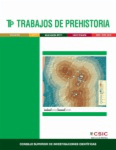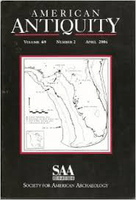
Magallania
metrics 2024
Connecting Local Insights to Global Challenges
Introduction
Magallania is a pioneering open-access journal published by UNIV MAGALLANES, dedicated to advancing scholarly discourse in the field of Social Sciences. Since its inception in 2005, the journal has provided a platform for original research, critical reviews, and insightful analyses that address diverse issues affecting society in both local and global contexts. Based in Punta Arenas, Chile, Magallania has established itself as an essential resource for researchers, professionals, and students alike, particularly in its current position within the Q2 category of Social Sciences (miscellaneous) as of 2023. With an ongoing commitment to quality and accessibility, the journal aims to foster interdisciplinary dialogue and promote knowledge exchange, all while contributing to a deeper understanding of social dynamics and challenges. Magallania is indexed in Scopus, ranking competitively in the field; it reflects the dynamic scholarly environment that characterizes the vibrant region of Magallanes and beyond.
Metrics 2024
 0.28
0.28 0.80
0.80 0.60
0.60 21
21Metrics History
Rank 2024
Scopus
IF (Web Of Science)
JCI (Web Of Science)
Quartile History
Similar Journals

Archaeological and Anthropological Sciences
Exploring Humanity Through Science and HistoryArchaeological and Anthropological Sciences is an esteemed peer-reviewed journal published by Springer Heidelberg, specializing in the interdisciplinary fields of archaeology and anthropology. Since its inception in 2009, this journal has established itself as a pivotal resource for researchers and professionals, featuring cutting-edge studies that bridge the gap between the sciences and humanities. With its impressive 2023 Q1 rankings in Anthropology and Archaeology categories, the journal stands out in the Scopus landscape, ranking within the top 5% of its field—Rank #18/413 in Archaeology (Arts and Humanities) and Rank #28/502 in Anthropology. This is complemented by its commitment to disseminating high-quality research to a global audience, despite being a non-Open Access publication. The journal's scope encompasses innovative methodologies, archaeological findings, and anthropological insights that are vital for advancing knowledge and fostering academic discourse. As it moves toward its upcoming converged years, Archaeological and Anthropological Sciences continues to solidify its reputation as a key forum for scholarly exchange in these fields.

International Journal of Historical Archaeology
Unveiling the Past: Where History Meets ArchaeologyInternational Journal of Historical Archaeology, published by SPRINGER, stands at the forefront of archaeological scholarship, focusing on the intricate relationship between historical events and archaeological findings. With an impressive impact factor underscored by its ranking in the Q1 quartiles across various categories, including Archeology and History, this journal serves as a premier platform for researchers, professionals, and students alike to disseminate groundbreaking findings and theoretical advancements in the field. Although it is not an Open Access publication, the journal provides valuable insights through its rigorous peer-review process, enhancing the quality of contributions. Covering a breadth of topics from 1997 to 2024, it is vital for advancing knowledge in historical archaeology and offers an essential resource for those invested in understanding our shared past through the lens of material culture. The journal's commitment to fostering interdisciplinary discussions enriches the scholarly community and supports the evolution of methodologies and perspectives within the domain.

Belleten
Connecting Generations through Cultural StudiesBeleten is a distinguished academic journal published by TURK TARIH KURUMU, focusing on cultural studies and history. With an ISSN of 0041-4255, this journal has made significant contributions to the understanding of Turkey's historical and cultural landscape since its inception in 1971. Recognized for its scholarly rigor, it holds a notable Q2 ranking in both the Cultural Studies and History categories as of 2023, reflecting its substantial impact within these fields. The journal is accessible to a diverse audience, including researchers, professionals, and students, who seek to explore comprehensive studies and discussions on Turkish history and culture. While it does not operate under an open-access model, its commitment to high-quality research continues to resonate within the academic community. Situated in Ankara, Turkey, Beleten aims to foster scholarly dialogue and provide a platform for innovative research that addresses contemporary and historical issues relevant to Turkish society and beyond.

Trabajos de Prehistoria
Bridging Disciplines to Illuminate Our Prehistoric HeritageTrabajos de Prehistoria is a distinguished peer-reviewed journal published by the Consejo Superior de Investigaciones Científicas (CSIC) since 1988, and it has established itself as a vital resource in the field of archaeology and prehistory. With an impressive impact factor and an open access policy, the journal aims to disseminate high-quality research that contributes to the understanding of human history and prehistorical studies. This Spanish journal has consistently ranked in the top quartile (Q1) in both the Arts and Humanities and Social Sciences categories, reflecting its significance in advancing archaeological scholarship, with Scopus rankings placing it in the 85th percentile among its peers. Covering a broad scope of topics related to archaeology, it serves as a platform for innovative research that connects researchers, professionals, and students globally, enhancing academic dialogue and fostering interdisciplinary collaboration. Based in Madrid, European researchers and global academics alike benefit from its open access model, promoting wider distribution and accessibility of foundational studies in the field.

Fornvannen-Journal of Swedish Antiquarian Research
Bridging the Past and Present of Swedish HistoryFornvannen - Journal of Swedish Antiquarian Research is a distinguished peer-reviewed journal dedicated to advancing the field of antiquarian studies through rigorous research and scholarship. Published by the Royal Academy Letters, History & Antiquities in Sweden, this journal has been a cornerstone of archaeological and historical discourse since its inception in 1978. It currently holds an esteemed position in the Q3 category in both Archaeology and History as per the 2023 assessments, reflecting its commitment to promoting high-quality academic contributions. With an ISSN of 0015-7813 and an E-ISSN of 1404-9430, Fornvannen provides insights into Swedish antiquities and serves as a vital resource for researchers and scholars eager to explore the nuances of archaeological and historical findings. Although not an open-access journal, it offers a comprehensive platform for the dissemination of knowledge within the fields of arts and humanities. As it continues its journey from 2011 to 2024, Fornvannen remains pivotal in fostering scholarly dialogue and enhancing our understanding of Sweden’s rich historical tapestry.

AMERICAN ANTIQUITY
Preserving Knowledge, Inspiring Discovery.AMERICAN ANTIQUITY, published by Cambridge University Press, stands as a premier journal in the fields of archaeology, arts and humanities, history, and museology. With an enduring legacy since its inception in 1935, this journal has consistently ranked in the Q1 category across several disciplines, reflecting its significant impact and authority in shaping contemporary scholarly discourse. It boasts impressive Scopus rankings, placing it in the 99th percentile for archaeology and history, which underscores its critical role in advancing research and understanding of American archaeology and related fields. Although it does not currently offer open-access options, the journal remains a vital resource for researchers, professionals, and students seeking high-quality, peer-reviewed content. As it converges toward 2024, AMERICAN ANTIQUITY continues to foster innovative scholarship and preserve knowledge, making it an essential reading for anyone invested in the exploration of cultural heritage and historical narratives.

Prilozi Instituta za Arheologiju u Zagrebu
Illuminating the archaeological landscape with impactful research.Prilozi Instituta za Arheologiju u Zagrebu is a prominent academic journal published by INST ARHEOLOGIJU, dedicated to advancing the field of archaeology and related historical studies. Operating in Croatia, this journal serves as a vital platform for scholars, researchers, and students to disseminate innovative research and insights within the realm of archaeology, with a focus on the rich cultural heritage of the region. The journal spans contributions from 2002 to 2011 and has ongoing publication since 2013, reflecting its commitment to contemporary archaeological discourse. With a growing reputation, it has achieved a Q3 ranking in the fields of Archaeology and Arts and Humanities, and a Q2 ranking in History, signifying its impact and relevance in the academic community. Although Open Access options are not available, the journal remains an essential resource for those pursuing in-depth knowledge and research in archaeology. Researchers can harness the journal's extensive scope to explore critical historical narratives and archaeological findings, solidifying its importance in both local and global contexts.

Chungara-Revista de Antropologia Chilena
Illuminating the Past and Present of Chilean SocietiesChungara-Revista de Antropologia Chilena is a premier academic journal dedicated to the field of anthropology, showcasing research and discourse that emphasize the rich cultural heritage of Chile and its surrounding regions. Published by UNIV TARAPACA, this journal serves as a vital platform for scholars, researchers, and students keen on exploring anthropological studies, ethnographic fieldwork, and cultural analysis. With an ISSN of 0717-7356, it adheres to rigorous academic standards and strives to promote open dialogue on contemporary and historical issues across various communities. Although currently not indexed in prominent metrics, its commitment to scholarly excellence contributes significantly to the academic landscape, fostering a deeper understanding of anthropological practices in Chile and beyond. Authors are encouraged to engage with the journal's rich repository of knowledge while readers gain access to pivotal insights that drive forward the discourse within anthropology.

JOURNAL OF THE POLYNESIAN SOCIETY
Illuminating the Heritage of the IslandsJOURNAL OF THE POLYNESIAN SOCIETY, published by Polynesian Soc Inc, is a distinguished periodical that aims to disseminate high-quality research in the fields of anthropology, archaeology, and cultural studies. With an ISSN of 0032-4000 and E-ISSN 2230-5955, this journal serves as a key resource for scholars and practitioners interested in the rich historical and cultural narratives of the Polynesian region. Since its inception, the journal has published a multitude of scholarly articles, reflecting a convergence of research from 1971 to 2022, thus establishing itself as a foundational text within its domain. The journal is indexed in notable categories with a Q4 ranking in anthropology and a Q3 in both archaeology and cultural studies as of 2023, highlighting its relevant contributions to the academic community. Moreover, its impressive Scopus ranks position it within the 80th percentile for archaeology and the 67th percentile for anthropology, showcasing its dedication to scholarly excellence. Although not an open-access publication, the journal remains a vital avenue for academic discourse and exchange, making it a significant resource for researchers, professionals, and students dedicated to understanding the diverse cultures of the Pacific Islands.

Bulletin of the American Society of Overseas Research
Bridging gaps in knowledge with innovative research and discourse.Bulletin of the American Society of Overseas Research, published by the University of Chicago Press, serves as a premier platform for scholarly discourse in the fields of archaeology, cultural studies, and history. With its ISSN 2769-3600 and E-ISSN 2769-3589, this journal has swiftly established itself as a key resource for researchers, professionals, and students alike, demonstrating exceptional impact as evidenced by its Q1 rankings in multiple relevant categories for 2023. Notably, it holds the 93rd percentile rank in Arts and Humanities (History) and the 84th percentile in Social Sciences (Cultural Studies), evidencing its respected standing within the academic community. The journal's commitment to advancing knowledge and fostering interdisciplinary dialogue is complemented by its accessible publication from 2022 to 2024, making it an essential read for those engaged in the exploration of global cultural histories and archaeological research.